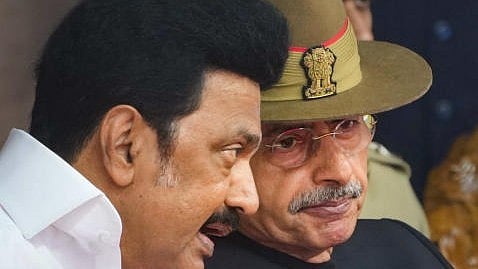
Tamil Nadu Governor R N Ravi with Chief Minister MK Stalin.
Credit: PTI Photo
Chennai: “The Supreme Court judgment is not just a victory for Tamil Nadu, but for all state governments in India… This is a historic verdict,” Chief Minister M K Stalin declared in the Assembly, moments after the apex court exercised its authority to deem ten bills withheld by Governor R N Ravi as having received assent.
Stalin could not hide his happiness at the “victory” that his government secured over the Governor’s action as he asked members from the DMK and its allies – AIADMK and BJP members had staged a walkout – to thump their desks in gratitude to the Supreme Court.
He “celebrated” further by offering sweets to DMK Rajya Sabha MP P Wilson, a key figure in the legal battle against the Governor, and honouring him with a shawl in his chamber.
The ruling is considered a landmark in India’s federal history, with the Supreme Court establishing timelines for Governors to act on bills passed by state assemblies.
For Stalin, the ruling is a significant boost as he positions himself as a unifying force against the BJP, which he accuses of undermining federalism and weakening state governments through governors.
It also provides him with another weapon to criticise the BJP, the DMK’s ideological rival in Tamil Nadu, where the saffron party struggles to gain a foothold.
For a party that has been espousing the cause of federalism and state’s rights from the 1960s, the verdict is not just a shot in the arm as it has come just a year before the crucial 2026 assembly polls, but further bolsters its ideological position that the Governor’s post was redundant in a democracy like India.
The endorsement that Governors have no absolute powers but have to act according to the advice of the Cabinet couldn’t have come at a better time as Stalin confronts the BJP on a host of issues, including the state’s two-language policy and delimitation.
DMK and Stalin are sure to project the verdict as an achievement and make it an election issue – the Chief Minister is already moving towards billing the 2026 electoral contest as one between Tamil Nadu versus Delhi (Centre).
“Stalin has already become the rallying point for all non-BJP Chief Ministers except Mamata Banerjee. This is a big victory for him and Stalin will go around rubbishing the BJP. He is blessed by the BJP’s flaws and faults in dealing with Dravidianism,” senior journalist R Bhagwan Singh told DH.
Wilson said the verdict was a huge win for the DMK government against Tamil Nadu Governor. “Article 200 does not allow for a pocket veto or absolute veto. Once a Bill is placed before the Governor, he must either assent, withhold assent, or reserve it for the President, but cannot sit on it indefinitely,” Wilson said.
DMK has long harboured a deep aversion to the Governor’s post — its governments were dismissed twice, in 1976 and 1991 — and fiercely contested Ravi’s actions in the Supreme Court.
It was Stalin’s father, M Karunanidhi, who, months after succeeding his mentor C N Annadurai as Chief Minister, established the Rajamannar Committee to bolster federalism. The committee recommended that governors function as constitutional heads, not as agents of the Centre.